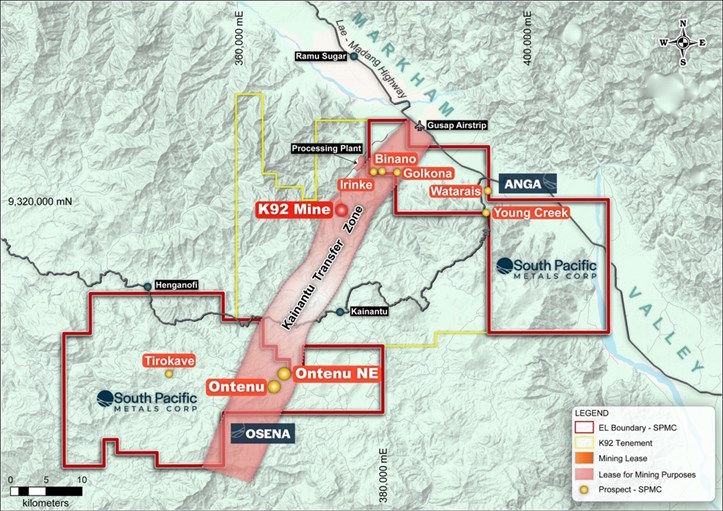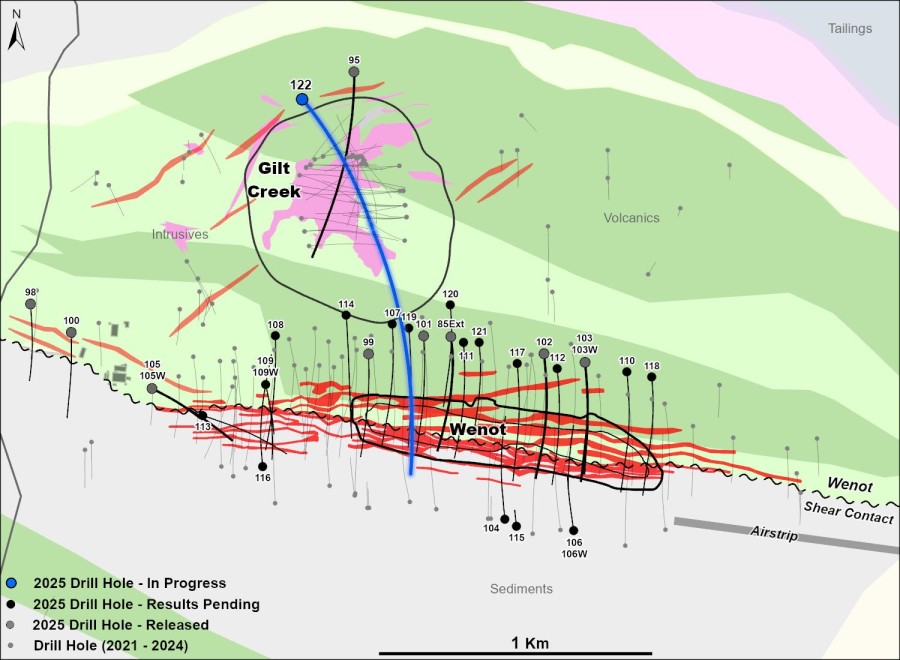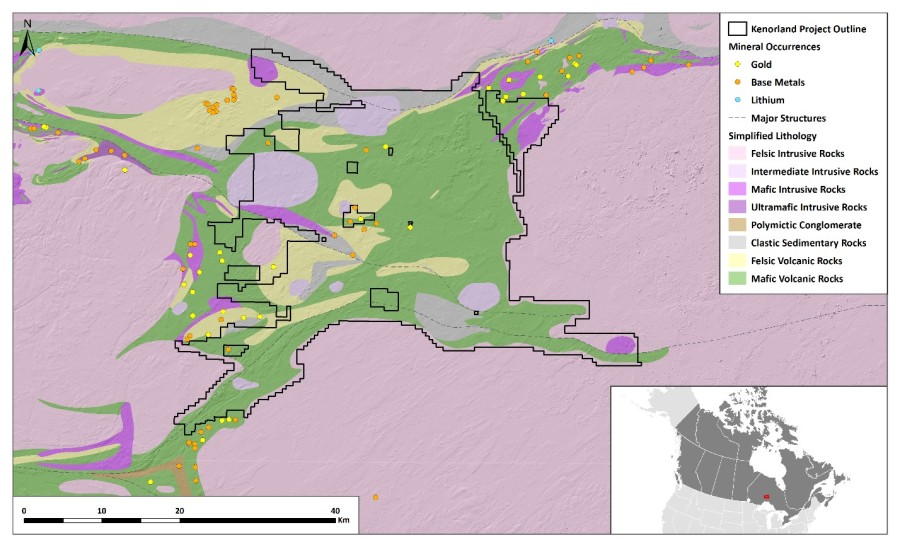AMSTERDAM, The Netherlands, April 18, 2017 /CNW/ - Meridian Mining S.E. (TSX V: MNO) ("Meridian" or the "Company"), today provided an update on exploration results from its Bom Futuro tin joint venture in the state of Rondônia in northwestern Brazil.
HIGHLIGHTS
- Exploration programs return strong primary tin results from the Bom Futuro Hill;
- High-grade intersection encountered in most drill holes, with broader low-grade halos;
- Highlights include 2m @ 3.7% Sn and 5.9m @ 1.26% Sn;
- Peak grades of 7.4% Sn encountered in the Bom Futuro pegmatites;
- Final data processing advancing on geophysics program for primary and palaeochannel targets.
"Results from our early programs have reinforced our belief that modern exploration techniques will uncover a range of exciting new opportunities in the Bom Futuro District," said Anthony Julien, President and CEO of Meridian. "We are continuing to engage with our Joint Venture Partners Coopersanta over development options in the Central Area based on the strength of these results, and will be expanding our geophysical targeting programs more broadly through the licence area as a near-term priority."
"The drilling results are particularly encouraging. For illustrative purposes, the comparable value in gold equivalent terms of a 1% tin grade is 5g/t Au (at year to date average LME prices for the first quarter of US$20,006 per ton for tin and US$1,238/oz for gold). Intersection grades of 3.7% Sn and 1.26% Sn equating to gold-equivalent grades of 18.6g/t and 6.3g/t highlight the exploration opportunities at depth at Bom Futuro. The Company is extending the scope of its metallurgical testwork program to include a review of the primary mineralization in conjunction with its tailing studies."
PROJECT BACKGROUND
Mineralization was discovered at the Bom Futuro Project in 1987 and mining operations have since generated 192,000t of tin, representing ~3% of global production. The Company's joint venture partner, Coopersanta, currently operates tailings retreatment plants, and palaeochannel / bedrock mines. Meridian ratified a joint venture agreement with Coopersanta in March following a three-month due diligence period. The Company is evaluating tailings reprocessing scenarios in allocated areas, and is exploring for primary / palaeochannel targets in the 2,000ha "Central Area", and a 18,000ha "Unexplored Area" (refer to press releases of December 19, 2016 and March 16, 2017).
MERIDIAN BEDROCK DRILLING PROGRAM
Eight holes tested the Bom Futuro Hill, an area of ~1 km2 where concentric ring structures dip moderately outwards around a central breccia pipe. These veins structures sit in a "roof pendant" setting, within a body of gneissic host rocks believed to overlie an untested source intrusion at depth (Figure 1). Three holes also tested the Palanqueta Granite, an intrusive body located to the immediate northeast.

Based on descriptions of the historical workings and the level of endowment, the Company believes that increased drilling may result in better delineation of thickened high-grade zones amenable to underground mining, and identification of clustered vein arrays amenable to lower-grade open pit mining. Meridian drill hole locations are illustrated in more detail in Figure 2, with results summarized in the annexed Intersection Table. Significant outcomes of the drilling and mapping program include:
- Coarse cassiterite mineralization persists at depth. Geologically "blind" vein and pegmatite bodies are present – mineralized bodies which have no direct surface expression (refer to sections of Figures 1, 3, 4). The ultimate depth limit to the vein system remains to be defined. The historical drilling has been ineffective in testing the depth extensions (with half of prior holes drilled to inclined depths of 60-100m, with a maximum depth of 220.7m) The outer limit of the mineralized ring systems also remains to be defined, with the structures concealed by younger cover around the foot of the Bom Futuro Hill.
- Meridian's drilling program has returned the best results from the Bom Futuro Hill to date:
- Hole DDH_BF_0009A, targeting the southern end of the Cascavel Pit, returned:
- 5.9m @ 1.26% Sn from 68.5m, including 1.03m @ 3.36% Sn from 68.5m; and
- 2m @ 3.70% Sn from 88.8m, including 0.55m @ 7.4% Sn from 88.8m (Figure 3).
- Other notable results included Hole DDH_BF_0008 (east of current mining area):
- 0.49m @ 7.21% Sn from 15.2m;
- 0.3m @ 1.97% from 22.8m; and
- 0.57m @ 4.03% from 74.7m
- Hole DDH_BF_0009A, targeting the southern end of the Cascavel Pit, returned:
- Strong concentrations of tin mineralization were reported from the pegmatites of the Cascavel Pit during its operations; this area presents a strong target for further evaluation down-dip from the historical workings.
- Multiple high-grade intersections were encountered in many other holes. Considered in conjunction with lower grade mineralization, results can be composited into wider intervals including:
- Hole DDH_BF_0001: 100.3m @ 0.14% Sn from surface;
- Hole DDH_BF_0008: 70.75m @ 0.16% from 15.2m; and
- Hole DDH_BF_0009A: 88.04m @ 0.24% Sn from 53.3m.
- Further review is required to assess the bulk intersections, as not all holes are extended to consistent depths through the same sequence of veining (Figure 4), and the vein systems are open at depth.
- A multi-element review remains in progress, with additional results and sampling pending. A variety of metals and minerals of economic interest have been recorded in the Bom Futuro system, including lithium mica, sulfides (sphalerite, chalcopyrite, galena, stannite), wolframite, columbite-tantalite (typically as inclusions in the cassiterite), ilmenite and rutile. Historical multi-element drilling data also indicates some silver is also present in the system, with peak bedrock grades of 1m @ 77 g/t Ag from 202m and grades of 1-3 oz/t Ag encountered in the overburden.
- Evidence of alteration was observed over the central breccia pipe during mapping. One short drill hole was positioned to test this position, encountering a broad interval of low levels of mineralization:
- Hole DDH_BF_0011: 41.06m @ 757 ppm Sn from surface, including: 0.5m @ 1.19% from 9.1m
- The recognition of anomalous tin gives rise to untested target styles for breccia-hosted mineralization, with deposits known to occur in such settings in other tin mining districts, with lodes sometimes concealed from the surface (e.g. Ardlethan Tin Field, Australia; Uchkoshkon Tin Deposit, Kyrgyzstan, Sadisdorf, Tin Deposit Germany).
- Locally intervals of saprolite-hosted mineralization have been encountered, indicating that not all mineralized saprolite has been stripped by previous operations in the area:
- DDH_BF_0010: 22m @ 400ppm Sn from surface (over Palanqueta Granite); and
- DDH_BF_0002: 12.92m @ 522ppm Sn from surface (southern flank of Bom Futuro Hill).
Such zones may have been too low grade for garimpeiro-style workings, but may offer potential synergies with a more sophisticated tailings retreatment plant. Opportunities to optimize low-grade remnant resources will be discussed with the joint venture partner Coopersanta.



MERIDIAN GEOPHYSICAL EXPLORATION PROGRAM
Meridian engaged the Brazilian contract ground survey group AFC Geofisica to complete orientation gravity, ground magnetic, and chargeability / resistivity surveys. The data has been undergoing processing by AFC and Meridian's geophysical consultancy Core Geophysics. The survey covered the northern half of the Bom Futuro Hill and extended northwards, covering a 2km2 area. Core Geophysics also supervised ~80 line kilometres of trial Ground Penetrating Radar surveys using cutting edge UltraGPR technology. Data is undergoing final processing by Groundradar Inc and Core Geophysics.
Primary and palaeochannel targets are emerging from this review. The Company will provide an update on the geophysical evaluation in due course.
NEXT STEPS
- Further detailed geological interpretation will be undertaken in the Central Area, in conjunction with multi-element analysis of core, channel samples, and historical pulps (where available). A further round of drill target definition will follow the completion of ground geophysics over the southern sector of the Bom Futuro Hill environment.
- Reconnaissance field evaluation is now extending into the "Non-Explored" area, although mappable exposure is more limited due to the younger sedimentary cover. Quotations are being sought from aerial survey contractors for aerial magnetic / conductivity / radiometric surveys, with the intention to complete surveys in the second half of the year during the dry season after permits are obtained. The aerial surveys will be designed to fast-track the definition of the channel trends and resolve shallow bedrock structure and primary mineralization targets.
INTERSECTION TABLE
Intersections are quoted as down-hole lengths. The drilling intersects the vein packages at high angles and true widths are estimated at >90-95% of the intersection width.
QUALIFIED PERSON
The technical information about the Company's exploration activity has been has been prepared under the supervision of and verified by Dr. Adrian McArthur (B.Sc. Hons, PhD. FAusIMM), the Chief Geologist of Meridian Mining, who is a "qualified person" within the meaning of National Instrument 43-101.
ABOUT MERIDIAN
Meridian Mining S.E. is focused on the acquisition, exploration, development and mining activities in Brazil. The Company is currently focused on exploring and developing the BMC manganese project, the Bom Futuro tin JV area, and adjacent areas in the state of Rondônia. The Company employs a two-pronged strategy with the objective of growing pilot production while advancing a parallel multi-commodity regional exploration program. Meridian is currently producing high grade manganese at its project located at Espigão de Oeste.
Further information can be found at www.meridianmining.co.





